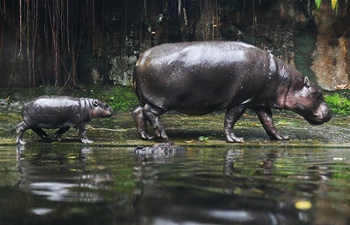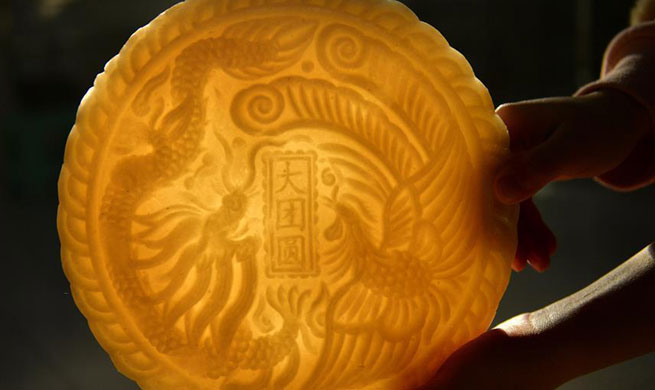BEIJING, Jan.11 (Xinhua) -- Giant pandas are commonly believed to have originated in southwest China's Yunnan-Guizhou Plateau. But 10-million-year-old tooth fossils found in Hungary have raised new doubts about the black and white bear's ancestors.
According to a paper published in Geobios last October, Canadian and French researchers have discovered the teeth of an ancient animal that resembles a modern-day giant panda during excavations in the Hungarian town of Rudabanya.
By comparing the dental micro-wear and comparing the shape, structure and wear patterns of the teeth with those of other bears, scientists concluded the creature, called Miomaci panonnicum, might have had a diet similar to modern giant pandas, and therefore pandas may have originated in Europe, rather than Asia.
But Chinese paleontologist Huang Wanbo said the conclusion is not well-grounded.
"The fossil they found is rather small, and it lacks the very specialized dental anatomy found in modern giant pandas," said Huang, researcher of the Institute of Vertebrate Paleontology and Paleoanthropology of the Chinese Academy of Sciences.
Today, pandas only live in China's southwestern subtropical bamboo forests. The animal is considered a "national treasure" in China, yet few people really know how the giant panda evolved.
Since giant pandas are confined to China, many researchers had assumed China to be the origin of the panda family. Some fossils support this idea.
In the 1980s, Chinese scientists discovered dental specimens of the primal panda in Lufeng in China's southwestern Yunnan Province. The fossils, dating back 8 million years, suggest the primal panda was the oldest known panda and gave rise to the panda line.
However, in 2012, the 11.6-million-year-old teeth of an ancient animal were discovered in Spain. Some scientists claimed the teeth belonged to Kretzoiarctos beatrix, the oldest known direct ancestor of the giant panda, and they believed the giant panda's ancestors originated in Europe before migrating to Asia. The newly found Miomaci teeth also became evidence for the theory.
"It's true that the giant pandas' premolars and molars have become enlarged and very broad compared to bear teeth to help crush bamboo. Teeth found in Spain and Hungary have shown such features. But a close look at the dental remains of the primal panda will tell us how different they are from their European cousins -- smaller teeth with shorter cusps and wrinkled crowns," said Huang.
Huang said the current findings could only prove that both Miomaci panonnicum and Kretzoiarctos beatrix are an extinct "cousin" of the modern panda, rather than a direct ancestor.
"The specimens found in Spain and Hungary suggest they are at different evolutionary levels than the primal panda. They have nothing to do with modern pandas in China. You could say there might have been pandas that originated in Europe but became extinct later. We need more evidence for such a claim, though," said Huang.
















